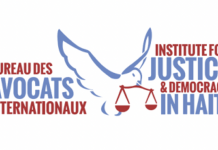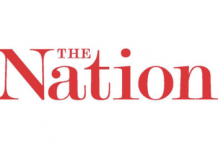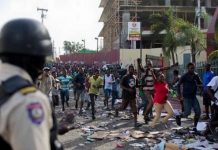by Roger Annis and Kevin Edmonds (Haiti Liberte)
The think-tank International Crisis Group (ICG) issued a 28-page report on the UN Mission to Stabilize Haiti (MINUSTAH) on Aug. 2, 2012. Entitled “Towards a Post-MINUSTAH Haiti: Making An Effective Transition,” the report’s central recommendation is that the military occupation regime should remain in Haiti for at least another five years.
This is the sixth report the ICG has produced on Haiti since the January 2010 earthquake. The organization has shown a capacity for frank and unbiased opinion. Its study on shelter and housing issued in June 2011, for example, criticized the Haitian government and its international sponsors for utterly failing to meet the desperate housing needs of Haitians.
In this latest report, however, the group accepts without question the presence of MINUSTAH and its claim to have the best interests of Haitians at heart. The report amounts to a political whitewash that misrepresents the political circumstances that brought the mission to Haiti in 2004 and has kept it there ever since.
MINUSTAH’s origins and achievements
As its name suggests, the ICG studies countries deemed to be destabilizing the international political order. It has 130 staff around the world. Its board of trustees is comprised of establishment political, business, and media figures, including chairperson Thomas Pickering, former U.S. Undersecretary of State and Ambassador to the U.N., and president Louise Arbour, a Canadian and former Chief Prosecutor for the International Criminal Tribunals for the former Yugoslavia and Rwanda.
On page one, the report says: “MINUSTAH’s principal mandate was to establish a secure and stable environment within which Haitian constitutional and political processes could take place.” Toward this end, it has supported to the Haitian National Police (PNH), maintained “rule of law and public safety,” assisted in organizing elections, and promoted and protected human rights, the report says, concluding that “MINUSTAH’s contribution to generally improved security conditions is recognized both in Haiti and abroad.”
Further on, we read: “Political violence has significantly diminished” since 2004. The mission has assisted, “two national elections (2006 and 2010/11) which restored constitutional rule.”
Disaster relief is listed as one of MINUSTAH’s accomplishments, although the force has come under intense criticism in Haiti for its relatively feeble contribution to humanitarian relief. Most of its huge annual budget of over $800 million is spent on policing and other forms of “security.”
The report says the economic outlook is “still encouraging,” with 6% growth foreseen for 2012, though it notes that the “Open for business” policy of the government of President Michel Martelly and Prime Minister Laurent Lamothe “will take time and requires a broad political consensus.” The latter is patently absent.
An opposite view of Haiti’s economic future was recently published (in French) by Haitian economist Camille Chalmers. Entitled “The Economic Balance Sheet of Reconstruction,” his article looks at the statistical trends in Haiti’s economy and concludes that the “figures show the impossibility of generating sustained growth” under Haiti’s current economic and political regime.
The real history
The International Crisis Group’s skewed interpretation of MINUSTAH’s origin goes right back to its first report on the subject in November 2004. There, we read: “In early 2004, after several years of fruitless diplomatic efforts to bridge political polarization, Haiti was again convulsed by political violence. Pressured particularly by France and the U.S., Aristide left the country on 29 February.”
This is a misleadingly polite description of a violent coup d’etat against the elected President Jean-Bertrand Aristide and all the other institutions of elected government of the country. Washington then installed an illegal and unconstitutional regime (“transitional government of technocrats” in ICG-speak) which, in the words of a 2004 human rights study by U.S. attorney Thomas Griffin, unleashed a “whirlwind of violence” against Haiti’s poor majority attempting to resist the coup, fully backed by the military violence of the newly-created MINUSTAH.
The U.S., France, and Canada provided vital military and political assistance to the coup and the illegal “technocrat” regime. These three nations then proposed MINUSTAH to the UN Security Council in order to disguise as international “peace-keeping” their military take-over of Haiti.
MINUSTAH has been in the country ever since. Composed of police and soldiers from over 50 countries around the world, the majority of its foot soldiers are from Latin America.
The ICG praises MINUSTAH for its role in facilitating Haiti’s elections. Yet the mission and the troika that stands behind it have financed and provided essential technical support to elections that have excluded Haiti’s most vital political forces, most notably the Lavalas Family party founded by Aristide in 1996. The party won a decisive victory in the last truly free election in Haiti, in 2000, but has been excluded from every election since then.
What’s more, the elections of 2009, 2010 and 2011, which the ICG so highly praised, scored modern history’s lowest participation rates for Haiti and, indeed, for the entire hemisphere.
The ICG concedes some possible wrongdoing by MINUSTAH — notably its conduct in recklessly introducing the cholera bacteria via its Nepalese contingent in October 2010 — but its overriding concern is for the force’s reputation. The ICG cites an April 2012 report by UN independent expert on human rights, Michel Forst, saying that further stalling on accepting responsibility for cholera’s introduction “will do nothing to promote a good understanding of the activities of MINUSTAH.”
Echoing recent U.S. and European Union declarations, the ICG says the next vital step for Haiti is the formation of a permanent electoral council to hold national and local elections. Most of Haiti’s parliamentarians and civil society have denounced this project, now championed by Martelly. They call for a provisional electoral council instead, saying a permanent one would be arrived at unconstitutionally and would reinforce the exclusion of Haiti’s poor majority from political life.
The MINUSTAH record
It is difficult to square the ICG’s positive interpretation of MINUSTAH’s record. It’s been more than eight years since the coup d’etat and more than two years since an international earthquake relief program promised billions of dollars of aid to multiple international agencies in Haiti. Yet a “strategy for the urban poor, including displaced persons in camps and post-earthquake informal communities, is still missing,” the report says.
The ICG also flags the “chronic failure (by successive Haitian governing regimes) to tackle poverty, inequalities and exclusion, which endanger most of the population.”
After expressing concern over how the cholera epidemic will hurt MINUSTAH’s reputation, the report says that accountability for cholera (including establishing clean water delivery systems) is now in the hands of the Pan American Health Organization. It says a decision was reached during the recent Rio+20 Earth Summit to fund clean water systems in Haiti with $2 billion. But like so many other sentiments expressed at Rio+20, this promise will likely fall short unless decisive international pressure is brought to bear.
The ICG made no other mention of compensation owed to Haiti’s cholera victims despite a suit pending against MINUSTAH for its responsibility.
And while the ICG is happy to reach back into Haitian history to buttress its pro-MINUSTAH arguments, it conveniently ignores concerns expressed for years about the threat of waterborne diseases to the Haitian people. Of note is Partners In Health’s 2008 report that slammed, in particular, the coup-backing countries of 2004 for having blocked international loans to Aristide’s second government to build potable water systems. (See Wòch nan soley: The denial of the right to water in Haiti.)
The ICG’s defense of MINUSTAH’s performance in establishing “security” is not very convincing. The force’s first tasks, we read, were disarmament, demobilization, and reintegration of former soldiers of the Haitian army that was disbanded in 1995 (these were the core of the paramilitaries that staged the 2004 coup); neutralization of urban gangs; curbs on crime; and a purge of the PNH. “None of these goals have been fully achieved,” we read.
Nor has police corruption been tackled. The report says that 137 cases of police corruption or misconduct have not been investigated. The body in charge of such cases, the Higher Council of the National Police, has been chaired by none other than Haiti’s succession of prime ministers, that is, the products of the supposedly successful elections midwifed by MINUSTAH.
The ICG report’s long Part Three is devoted to MINUSTAH’s “exit strategy”, but on pages 18-19, we read a long litany of failings of the force and the Haitian government in laying the necessary groundwork. Rule of law, prison and judicial improvements, legal aid services, social services — progress on all is deemed absent or lacking.
Concerning MINUSTAH’s accountability, the ICG notes that MINUSTAH never created a “Claims Commission” that would allow Haitians to seek redress for alleged wrongdoings. Yet this was one of the conditions contained in the Status of Forces Agreement that MINUSTAH signed with Haiti’s de facto regime in 2004.
“There is no transition or exit strategy as yet (for MINUSTAH),” the ICG concludes. “The UN will need to remain in Haiti for a long time.”
Contradictions in the ICG report
The ICG report is full of other contradictions. For the ICG, Haiti is undergoing five transitions — from violence to reconciliation and peace; non-democratic culture to a democratic society; a failed to a modern national state; poverty and social injustice to a thriving and equitable economy; and from a country destroyed by an earthquake to one “not only being rebuilt but ideally transformed.” (page 4)
“A humanitarian imperative amid ongoing political instability, sporadic violence and recurring natural disasters continues to suggest the need for a strong international presence,” says the report, and MINUSTAH must “ensure that a phased withdrawal is linked to stronger institutions and progress toward lasting stability and development.”
The goal in post-earthquake Haiti is “support for the holding of elections to put in place a government and thus speed up reconstruction.”
All of this makes clear that, in the minds of the report’s writers at least, human development is required before “security” can be achieved. But the ICG then incongruously acknowledges that MINUSTAH spurns all responsibility to assist human development. The report says it is a “popular misconception” to think that MINUSTAH can shift from being a policing agency to development agency: “MINUSTAH’s mandate does not include development as its priority.”
So the MINUSTAH formula, endorsed by the ICG, turns in circles — policing, and no development; and no development, but policing.
Another contradiction is the report’s strong praise for MINUSTAH’s assistance to elections. On page 6, it says such support is “essential” but, on page 22, recognizes that it undermines the credibility of electoral outcomes: “International financing of more than half of the costs of elections, continuing technical assistance to the CEP [Provisional Electoral Council] and MINUSTAH’s logistics involvement made it easy for some Haitians, particularly those unhappy about Lavalas’ absence from several elections, to criticize MINUSTAH and the international community for interference in the country’s politics.”
The ICG calls President Martelly’s plan to revive the human rights-violating Haitian army “questionable” but then asserts that “many Haitians” support the plan. Its cited source for this assertion is one, unnamed Haitian government official. But Robert Muggah, former director of the Small Arms Survey, found overwhelming opposition to resurrecting the army during extensive surveys he and other researchers conducted and published in an October 2011 report.
Finally, the ICG report makes a deeply biased assessment of the Lavalas Family party which it calls one of three key “dangers” to “reconciliation” in Haiti. The other two dangers are “the Martelly presidency’s Duvalierist imprints”(!) and “the reappearance of former members of a once brutal army” (whose restitution was previously termed only “questionable”).
Furthermore, actions by Lavalas-inspired political representatives in Haiti’s Parliament are described as having “slowed government progress” in the first year of Martelly’s presidency.
Conclusion
In 2011, an international group of scholars, doctors, and activists published through the Harvard School of Public Health a comprehensive review of the deeply troubling, post-earthquake human rights record of MINUSTAH, entitled “MINUSTAH: Keeping the Peace or Conspiring Against It?”
A writer of this article was a co-author of that White Paper, which was a response to the premise that if MINUSTAH leaves Haiti, the country will collapse into a spiral of violence from which it will never escape. Edmond Mulet, MINUSTAH’s former chief, said the country would “just fall apart” if MINUSTAH were to leave. He described Haiti as “a society, community, a nation that has committed collective suicide” due its alleged political infighting. (Mulet is Guatemalan.)
The Harvard report notes that there are higher levels of “insecurity” and violence in neighboring Caribbean states such as Jamaica, Trinidad and the Virgin Islands, as well as many U.S. cities, than in Haiti. This nullifies MINUSTAH’s principal justification.
In fact, much of Haiti’s instability is the direct result of MINUSTAH’s ongoing human rights abuses, the White Paper contends. “MINUSTAH’s continued presence is justified by the levels of unrest, or potential for unrest, in Haiti,” the paper notes. “Since the earthquake, the only significant civil discord in the country has targeted MINUSTAH for introducing cholera or failing to respond to IDP [internally displaced persons] camp conditions, or expressed anger over fraudulent elections. MINUSTAH responded to these peaceful protests with violence, including tear gassing students and IDPs, assaulting international journalists, shooting at children, and even killing peaceful protestors.”
Thanks to WikiLeaked revelations published last year in the weekly Haiti Liberté newspaper and The Nation magazine, we have learned from former U.S. ambassador to Haiti Janet Sanderson that “the UN Stabilization Mission in Haiti is an indispensable tool in realizing core USG [U.S. Government] policy interests in Haiti.” MINUSTAH is, she said, “a financial and regional security bargain for the USG.”
Furthermore, MINUSTAH’s definition of developing an environment of political stability is highly exclusionary and indeed helps destabilize the country. In that revealing Oct. 1, 2008 secret cable, Sanderson said that a “premature departure of MINUSTAH would leave the [Haitian] government… vulnerable to… resurgent populist and anti-market economy political forces — reversing gains of the last two years”.
MINUSTAH has carried out a series of human rights violations resulting in a loss of Haitian sovereignty, stability, dignity, and life. Its record of engaging in acts of extrajudicial murder, sexual assault, suppressing peaceful political protests, undermining democracy, and introducing cholera into Haiti are more than enough grounds for revoking its mandate. Yet for geopolitical and economic reasons, this does not happen.
“At such a crucial point in Haiti’s history, and with years of failures, inaction, repression, and human rights violations documented, it is time that MINUSTAH respect the Haitian people’s wishes, and the wishes of many of its members’ citizens, and withdraw from Haiti,” the Harvard report states. “Arguments of greater instability cannot justify the current abuse and violence against Haitians.”
In short, the Harvard White Paper stands in sharp counterpoint to the ICG report and arrives at an opposite conclusion: “Just as concern of post-MINUSTAH instability cannot justify a single violation of a Haitian’s rights by an occupying force, no solution to Haiti’s problems can include foreign, armed military on its soil. If the UN and its members want to support Haiti, MINUSTAH’s nearly one billion USD yearly budget should be put toward sanitation, shelter, health, infrastructure, and education, not arms and soldiers that result in death, sexual assault, and the subversion of democracy.”
Brazilian MINUSTAH troops deployed in Port-au-Prince during large demonstrations in April 2008. “No solution to Haiti’s problems can include foreign, armed military on its soil,” said a 2011 Harvard report.
Roger Annis is a coordinator of the Canada Haiti Action Network in Vancouver BC and publishes on Rabble.ca. Kevin Edmonds is a graduate student at the University of Toronto and an author of the 2011 MINUSTAH: Keeping the Peace or Conspiring Against It? He writes a blog, The Other Side of Paradise on the NACLA website.





